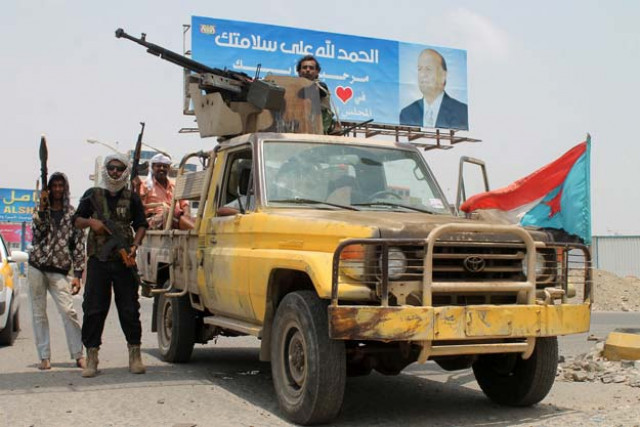Houthi rebellion: Saudi expectations from Pakistan remain unchanged
Special adviser says Riyadh wants Islamabad to stand with coalition forces

Special adviser says Riyadh wants Islamabad to stand with coalition forces. PHOTO: AFP
Notwithstanding a Pakistani parliament’s nay for joining the Saudi-led nine-nation military coalition against Houthi rebels in Yemen, Riyadh’s demands from Islamabad remain unchanged. The kingdom wants to see Pakistan stand with the coalition Riyadh has coalesced to quell the Houthi insurrection, Special Adviser to the Saudi Ministry for Religious Affairs Dr Abdul Aziz bin Abdullah al Amar said in an exclusive chat with The Express Tribune.
Asked about Pakistani parliament’s decision to stay away from the conflict in the Arabian Peninsula, he said: “I don’t want to comment on the internal affairs of Pakistan, but the kingdom’s expectations from Pakistan are very justifiable and rational when we say join us to fight against a cruel minority [Houthis] to save an oppressed majority in Yemen.”
The Saudi adviser also welcomed the UN Security Council resolution calling for an arms embargo on the Houthis and freezing of assets of the rebellion leaders. “We want the implementation of the resolution in its true spirit,” he said, “through its implementation all the problems can be resolved.”
“The Houthis are not more than one per cent of Yemen’s population and still they are fighting [but] with external reinforcement,” Dr Abdul Aziz said in a veiled reference to the alleged role of Iran in supplying the rebels with weapons and equipment. “The Yemen crisis is an issue of external interference,” he added. “It’s not a sectarian conflict.”
He maintained that Saudi Arabia had no enmity with Yemen. “Yemen is also an Arab country and people of Yemen are like us [Saudis],” he added. “We have shared culture, values, mosques and the same books. Zaidis are also Sunni and we are not targeting them.” Dr Abdul Aziz said the coalition forces were only targeting those who were targeting the innocent. “The forces are working according to a particular plan and the Houthis are losing ground,” he claimed. “We are satisfied with our progress so far.”
The background
Tracing the history of the unrest in Yemen, the Saudi adviser claimed the current crisis was very different from other disputes between different organisations and groups.
Houth, he said, is a small village in northern Yemen where the Houthis’ leader Badruddin Houthi, was born. He was impressed with the 1979 Iranian revolution. He became a part of Yemen’s parliament first and then formed a militant wing, which is now known as the Houthis.
He said Riyadh did not believe in intervention in the internal affairs of other regional countries. “Saudi Arabia has always remained neutral,” Dr Abdul Aziz said. “We are not fighting against Shias and Yemen is not a Shia country. We don’t have any differences with them.”
Then why did the Saudis not intervene in Egypt when President Mohamed Morsi’s government was toppled? He claimed that Morsi’s government was toppled by the Egyptian army and the Islamic Brotherhood government did not seek any assistance from the kingdom.
The Iran factor?
Dr Abdul Aziz drew parallels between the Houthi militant wing and Hezbollah and their style of training. “Why is Iran running worldwide if it is not a stakeholder in this war?”
He claimed the Houthis had long-range missiles that could target installations up to 500 kilometres away. “Hezbollah is providing military training to the Houthis and there is also evidence that Iranian and Hezbollah forces are also taking part in these operations.”
To a question regarding Iran’s recent nuclear deal with world powers, the adviser said Saudi Arabia had nothing to do with Iran’s nuclear capability. “We have reservations over Iran’s expansionist designs,” he added. “They have exported revolutions to many countries and caused unrest. They did not even spare South America, where hardly few Muslims live.”
Dr Abdul Aziz claimed that if the coalition forces had not targeted the Yemeni rebels, integrity of the kingdom and Harmain Sharifain (two holy mosques) would have been in danger. “The two holy mosques are in safe hands,” he added. “We can defend ourselves against any external threat.”
Published in The Express Tribune, April 19th, 2015.



















COMMENTS
Comments are moderated and generally will be posted if they are on-topic and not abusive.
For more information, please see our Comments FAQ